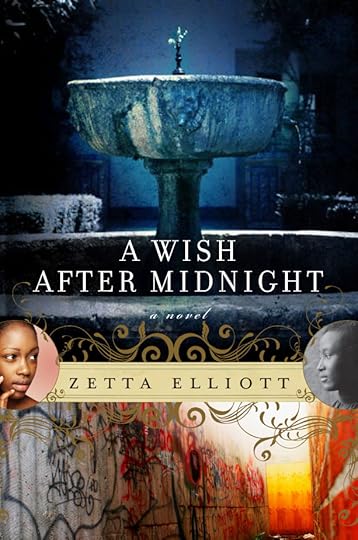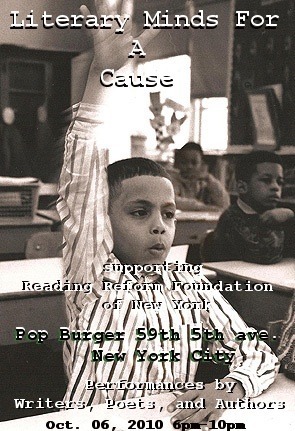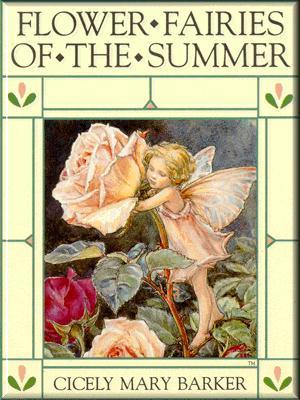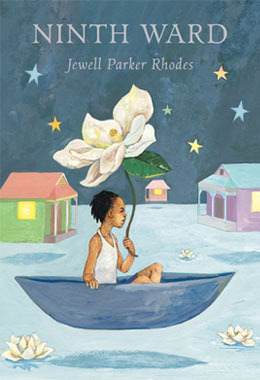Zetta Elliott's Blog, page 105
October 4, 2010
best Monday ever
 This could be the best Monday morning ever! Not because of the rain and gloom outside, the stack of books I need to read, the conference papers I need to work on, or the mound of laundry staring at me. It's a great day because a former student of mine who now works in New Orleans public schools just sent me this message:
This could be the best Monday morning ever! Not because of the rain and gloom outside, the stack of books I need to read, the conference papers I need to work on, or the mound of laundry staring at me. It's a great day because a former student of mine who now works in New Orleans public schools just sent me this message:
By the way, I've been meaning to tell you about a student of mine. Her name is L. L is one of those students who has the potential to be extremely smart, but somehow gets caught up in being the opposite by constantly being disrespectful and disruptive. I think she needs different attention because of her home situation, but when teachers have 20+ students in a class, they tend to not have time for that.
One day last week, L was acting out in English class, as she did almost every day. The teacher wanted me to take her out because he was frustrated and had no other solution. As a support teacher, I'm able to do that because I don't have my own class, so I took her out of the room. I told her to take out a book because I wasn't going to let her sit and do nothing and of course she didn't have one. Shockingly she said she wanted to read a chapter book (which almost none of the students say) and so I showed her all of the ones I had.
Among the books was A Wish After Midnight, which she chose immediately. I was secretly hoping that she would, but I was also curious if she would reject it because of the higher reading level. (Even though she is about 14 in seventh grade and reads better than most of her peers, she gets frustrated when challenged.)
To my surprise, she read the book for the rest of the period.
Afterwards, she asked me if she could take it home that night to read it. I hesitated because I didn't want to lose it, but seeing her
enthusiasm, decided to let her borrow it. Every day after that, every time I saw her in class or in the hallway, her nose was buried in that book. Granted, she still didn't do her schoolwork in class, but instead of singing or talking or banging on the desk or walking around and messing with somebody, she would be reading the book. It seemed to be what she needed.
Unfortunately, L's bad behaviors built up so much that she was
forced to transfer to a different school (they do that sometimes in
order to avoid expelling a student). I didn't get a chance to see her again before it happened, but I'm glad to know that she had Wish with her. I hope she is able to finish it and learn something from what you have put in its pages. It really touched me to see her find some kind of peace from reading it. I think Genna is a character that she can relate to. Maybe one day I will be able to ask her about it.








October 2, 2010
Literary Minds for a Cause
 If you're in the city, come out this Wednesday as we show support for the Reading Reform Foundation. Guest speakers include Dr. Brenda Greene and Asadah; hosted by WBAI's Digo RockZtar. For more information, visit their Facebook page.
If you're in the city, come out this Wednesday as we show support for the Reading Reform Foundation. Guest speakers include Dr. Brenda Greene and Asadah; hosted by WBAI's Digo RockZtar. For more information, visit their Facebook page.








October 1, 2010
another ally
It's amazing how tragedy can inspire such courage. Shelley is a socially conscious blogger, an ally, and a *serious* reader—more than a third of the titles she read this year are by people of color, and her goal is to "do better"! Her most recent post on growing up queer came from deep within and should be read widely:
As for my family, well, I can't report that things went all that well. It's one of the sadnesses of my life that my mother died before ever really coming around to acceptance and understanding as I'd like to think she would have eventually. But that doesn't mean she stopped loving me, she always did and always expressed it, and yes, these things are complex, your family can oppress and love you at the same time and you know what else? Somehow you get past the pain and disappointment and you grow and thrive and life your life. Even if your family never does embrace your true self the way they should, that does not destroy you. You find support elsewhere, from teachers and elders and friends and lovers, you look around and realize that the joy and fulfillment of living as your own true self, your gay as a goose queer as the moon self, will sustain you.
I've segued into speaking to you, my dear precious beloved queer children and youths, so let me go on and address you directly. You may feel like you're the only one. You may be sure your family and friends will reject you. You're not the only one, not by a longshot. And for most of you, your family and friends will not reject you. They'll keep loving you. Many will accept and embrace you immediately–that's the result of these last 40-some years of the LGBT liberation movement. We've changed consciousness. There is much less bigotry and ignorance. Still, there will be some who let you know that they love you but also express their displeasure. This will hurt you terribly, but remember that you've got the rest of your life to watch them change, watch them come around and get over their homophobia; and in any case, your self-worth does not, must not, depend on them.
For those few whose family, captive to reactionary ideology, do reject you, hang on! You will find love elsewhere. You'll end up with a whole other family. You will! This will not destroy you, not as long as you can hang on at this most difficult moment.








sometimes people suck…
 …but sometimes people are AWESOME! Despite the torrential downpour here in Brooklyn, I feel kind of "up" today. The film I ordered (Looking for a Face Like Mine) arrived yesterday, and in 30 short minutes I learned about the ways resisting racism can actually lead to heightened creativity. Which is important for me, because I feel like I spend a lot of time blogging about racism in publishing and I do worry sometimes that I will become embittered and/or lose my creative impulse. But artists (and activists) are ultimately optimistic people—we wouldn't create/agitate if we didn't have hope for the future and a slender belief that our work can change people's perceptions. I was watching TV last night and that lottery commercial with the bunnies came on—have you seen it? I smile *every* time it airs, and I thought to myself: how many people know I love bunnies? and hummingbirds…and fairies? My college roommate and close friend hanged herself a couple of years after graduation; she was an artist, and I've never really allowed myself to delve into her despair. I focus instead on her legacy and the gifts she gave me—the print of a medieval unicorn tapestry, and the pocket book of flower fairies that still sits on my shelf. Which leads me to Awesome Person #1, Shveta, who has written this wonderful article about her own passion for fairies:
…but sometimes people are AWESOME! Despite the torrential downpour here in Brooklyn, I feel kind of "up" today. The film I ordered (Looking for a Face Like Mine) arrived yesterday, and in 30 short minutes I learned about the ways resisting racism can actually lead to heightened creativity. Which is important for me, because I feel like I spend a lot of time blogging about racism in publishing and I do worry sometimes that I will become embittered and/or lose my creative impulse. But artists (and activists) are ultimately optimistic people—we wouldn't create/agitate if we didn't have hope for the future and a slender belief that our work can change people's perceptions. I was watching TV last night and that lottery commercial with the bunnies came on—have you seen it? I smile *every* time it airs, and I thought to myself: how many people know I love bunnies? and hummingbirds…and fairies? My college roommate and close friend hanged herself a couple of years after graduation; she was an artist, and I've never really allowed myself to delve into her despair. I focus instead on her legacy and the gifts she gave me—the print of a medieval unicorn tapestry, and the pocket book of flower fairies that still sits on my shelf. Which leads me to Awesome Person #1, Shveta, who has written this wonderful article about her own passion for fairies:
I love faeries. I grew up reading all about them, believing in them, dreaming about them. I collected all the drawings, books, and winged figurines I could, I gobbled up lore like forbidden faerie food, I made wings out of poster board and glitter. I could rattle off bits of trivia like how the use of iron kept away unwanted visitors, that the fey inability to lie didn't preclude trickery, and that a brownie accepted gifts of food in return for cleaning a house. When things got bad, I told myself I was fey. It wasn't until I was in my early twenties that it even occurred to me there might be faeries outside Western Europe – specifically, outside the Victorian take on the Celtic and British traditions.
Shveta eventually began searching for fairies within South Asian storytelling traditions—in other words, she did THE WORK. And THE WORK is what matters, that search for something more, a way of reshaping our world.
Awesome Person #2 is Tricia Sullivan who is a writer and blogger and committed ally. Tricia has reached out to me more than once with words of support, and she even offered to help me find an agent! She walks the walk, and through her I've come to know Kate Elliott—Awesome Person #3! Kate has a great post up on her Livejournal blog about THE WORK she does to try to shape her children's understanding of social justice:
Prejudice is a form of hardening the heart. Prejudice, as we unfortunately know, comes in many forms. Just as human beings show a propensity to be tolerant and inclusive so also, often at the same time, and sometimes in the same person, they show a propensity to be intolerant and exclusive. Human beings are such forces for good, and yet such forces for bad, and sometimes in the same person. The contradiction makes one dizzy. I am not immune.
My TBR pile is actually quite manageable right now (!!!) and I hope you'll join me in supporting these two novelists (both have new books: Cold Magic and Lightborn).
Last but certainly not least we have The Rejectionist who also does THE WORK and fights the fight on multiple fronts. I didn't mean to suggest that banning books was somehow less important than fighting racism in publishing—and Le R. gets that. We're asking folks to care as much about one cause as the other.
Is it a coincidence that all these amazing women are part of the speculative fiction community? I think not…people who appreciate alternate universes believe in our potential to reshape reality. And I am VERY grateful to have such awesome allies in this world!








September 30, 2010
enough is enough
I spent some time this evening thinking about the recent suicide of Tyler Clemente, a student at Rutgers University who was cyber-bullied and shamed by his idiot roommate. I had seen updates on Facebook listing other gay teen victims, and I knew I wanted to post something with the word "enough." And then I thought about the list we made of nearly 60 MG & YA novels written by black authors this year—how many of those books spoke to the realities of queer youth? I haven't read them all, but judging from the summaries on Amazon, I don't think any LGBTQ teens are represented in those books. They're invisible in our books, and seemingly disposable in our society. Queer youth need to see themselves reflected positively in the world around them. I really admire the It Gets Better project and hope more PoC will make video testimonials that show how diverse the LGBTQ community is so that *all* our teens know they deserve and can have the future they want.








God bless librarians
book news
Most YA books don't get a full-page ad in the New York Times—unless they've been banned. This morning I read a PW article that reports Penguin has done this for Laurie Halse Anderson's novel, Speak, which has been called "soft pornography" by a professor in Missouri…the ad urges consumers to "read the book. Decide for yourself," which is both a sales pitch and a plea for freedom of speech. Edi and Carleen Brice have already talked about the profit factor attached to banned books. I wonder if publishers ever took an ad out for Roll of Thunder, Hear My Cry by Mildred D. Taylor, Black Boy by Richard Wright, Push by Sapphire, or Beloved by Toni Morrison. Anyone know? You can find a list of banned books here.
Looking ahead…it's time for both The Cybils and The Brown Bookshelf's 28 Days Later. So dig deep, find some titles by authors of color (more titles have been added to our list of MG/YA novels by black authors), and nominate them so that they, too, receive some recognition. You've got two weeks for the Cybils, and one month before 28 Days Later closes its nomination process…








September 28, 2010
round and round
Doret posted an interesting video over at Color Online; author Elif Shafak discusses the trouble with circles—if you enclose yourself in one, you'll wither from insularity and the lack of exposure to diverse people. But if you think of yourself as a compass, then one foot will remain rooted in your own world while the rest of you circles the globe—or whatever part of the world is within reach. And the point is, you SHOULD reach for what you don't know.
I have trouble with circles. In a way, they represent closure and I could definitely use some of that in this struggle to create greater diversity in publishing. But most days I feel like we're just going around and around, not really making any progress. When I read this PW article by Diane Patrick, I was heartened and put out. Heartened because I love it when a marginalized person refuses to be pushed offstage. Kwame Alexander was sick of authors of color being excluded from the National Book Festival in D.C. and so he started his own festival, Capital BookFest. But Alexander didn't stop there:
Next year's festival schedule will expand again to include Richmond, Va.; New Orleans; and an as yet undetermined city in the Caribbean. Alexander's goal is to have festivals in 15 to 20 cities in the next five years. "We are targeting cities that do not have a proper book festival, and have a strong or emerging arts/literary scene," he said, emphasizing, "This is a community-based effort, and we are bringing our expertise. So we build it from the community up; it's not us telling them what to do."
I have *such* respect for that rationale, and yet I wonder what these "alternative" literary events do to increase the involvement of authors of color in the big mainstream festivals. How many festival organizers now say, "We don't have to have more than one or two authors of color because they have their own events to attend." And round and round we go…Authors of color can't afford to wait for publishing insiders to "act right," yet when we establish our own awards, our own conferences, our own anything, does it send the message that we'd rather be on our own? I like to say, "Things wouldn't need to be separate if they were equal." Ideally, we'd all work together, right? But when doors are closed again and again, some of us get tired of knocking.
On a related note, how do we get bookstores to carry more titles by writers of color? Because if bookstores carry the books, they have a better chance of selling, and if they DO sell, publishers will have to admit there's demand for stories with multicultural perspectives. Right? Stop by ShelfTalker to read Elizabeth Bluemle's post on "Selling Color in a White Town." I'm getting dizzy just thinking about all of this…good night!








retreat or rethink?
 Brooklyn's under a tornado watch right now. It has stopped raining and there's a little light in my apartment, but it's otherwise kind of cave-like in here. A good day for writing, though I feel like I need to pause for a moment and get my bearings with this novel. I read Ninth Ward last week, and really admired the way Jewell Parker Rhodes told a beautiful, simple story about an incredibly traumatic moment in a girl's life; as I think about the book now, I'm struck by the author's ability to invoke the complexity of Hurricane Katrina without writing a long, dense narrative. I just passed 50K words with my novel, and wonder if I should stop adding new characters to the sequel. The challenge is to bring back some of the most memorable characters from Wish and have them interact with new characters in the same setting. One agent I met with suggested I cut Genna and Judah out of the sequel; I guess her rationale was that not enough people had read Wish and so a second book about their relationship wouldn't interest new readers. Needless to say, we parted ways. I want people to understand Judah and that means providing more of his backstory, which necessarily means introducing more characters into the novel. Right now I'm working on a chapter about Judah and his deeply flawed role model, Clive (his aunt's Kingman). For me, each chapter is like a scene in a movie—there are extras, and there are minor characters who steal the scene. But Genna and Judah are the stars—that doesn't change. Today's task is to go over the outline and figure out which scenes need to be crafted to draw the novel to a close. What's the most direct way to reinsert Paul into the narrative? Which characters from the past are most likely to accept Genna's offer to return with her to 2001? That's my problem, I guess–getting to the end means writing more scenes! Back to work…
Brooklyn's under a tornado watch right now. It has stopped raining and there's a little light in my apartment, but it's otherwise kind of cave-like in here. A good day for writing, though I feel like I need to pause for a moment and get my bearings with this novel. I read Ninth Ward last week, and really admired the way Jewell Parker Rhodes told a beautiful, simple story about an incredibly traumatic moment in a girl's life; as I think about the book now, I'm struck by the author's ability to invoke the complexity of Hurricane Katrina without writing a long, dense narrative. I just passed 50K words with my novel, and wonder if I should stop adding new characters to the sequel. The challenge is to bring back some of the most memorable characters from Wish and have them interact with new characters in the same setting. One agent I met with suggested I cut Genna and Judah out of the sequel; I guess her rationale was that not enough people had read Wish and so a second book about their relationship wouldn't interest new readers. Needless to say, we parted ways. I want people to understand Judah and that means providing more of his backstory, which necessarily means introducing more characters into the novel. Right now I'm working on a chapter about Judah and his deeply flawed role model, Clive (his aunt's Kingman). For me, each chapter is like a scene in a movie—there are extras, and there are minor characters who steal the scene. But Genna and Judah are the stars—that doesn't change. Today's task is to go over the outline and figure out which scenes need to be crafted to draw the novel to a close. What's the most direct way to reinsert Paul into the narrative? Which characters from the past are most likely to accept Genna's offer to return with her to 2001? That's my problem, I guess–getting to the end means writing more scenes! Back to work…








September 27, 2010
labor of love
Nikki Grimes has a great post up on her blog, Nikki Sounds Off.
Recently, an acquaintance, one I have not set [eyes:] on in years, casually asked me to drop in on her class as a favor and conduct a story hour with one of my books. When I declined, explaining that school visits are something I do professionally (i.e., something for which I am paid), she became very snippy with me. Sigh.
In the days that followed, I found myself wondering if she'd be inclined to ask a carpenter, one who had not...













